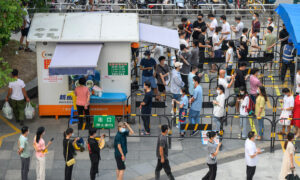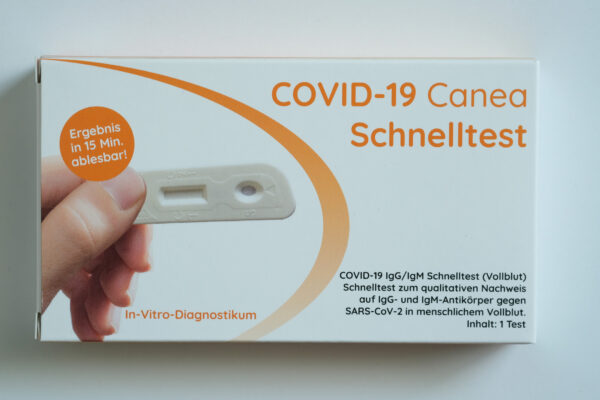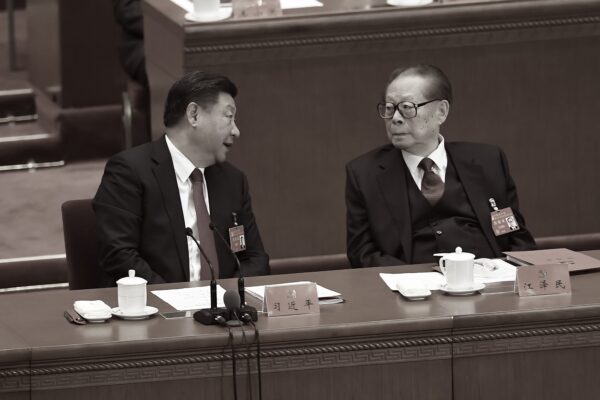China’s Propaganda Blames COVID Testing Companies for Failing to Control the Pandemic
News AnalysisAmid public outcry demanding an end to Beijing’s zero-COVID policy, Chinese state media recently set off a wave of criticism against COVID testing companies. One China expert claims the regime is preparing to take down a powerful group behind the COVID testing industry and using it as a scapegoat to divert public attention from the mass protests fueled by draconian pandemic measures. On Nov. 29, the regime’s mouthpiece, People’s Daily, published a commentary titled “If the COVID testing chaos continues, the epidemic will never end.” It claims that COVID-19 has not been eradicated because of unreliable and poorly made nucleic acid testing products. The article stated that test results determined COVID control measures, but as several testing companies emerged after the onset of the pandemic, shady practices were reported. Citing fraud cases of 10 COVID testing companies in seven provinces, the article said that these false test reports allowed the disease to spread, causing lockdowns to last for several months, even leading to citywide shutdowns. Therefore, these companies “must be severely punished in order to resolve such chaos.” One COVID testing company was targeted by the media. Lanzhou Nuclear Huaxi Testing Laboratory in Gansu Province, and its parent company, Shenzhen Nuclear Gene Technology, made headlines on Chinese news outlets and social media. As of Nov. 29, this topic received more than 1 billion views on the Chinese social media platform Weibo. According to a Nov. 25 statement by the local health commission, the Lanzhou Nuclear Huaxi staff mistakenly recorded several people as testing positive for COVID. This group would have been transferred to a quarantine facility, but after another round of testing, their results turned out to be negative. Moreover, the company’s history and activities raised suspicion. First, Lanzhou Nuclear Huaxi was able to conduct COVID testing soon after the company was established on Aug. 8. Testing companies usually go through a rigorous process before they can open for business. Second, in the past two years, the parent company and its subsidiaries in various regions of China allegedly committed several violations. According to a Nov. 29 report by China’s Health Times, Nuclear Huaxi and its affiliated laboratories violated regulations on 10 occasions between April 2020 and November 2022. These violations include the following: mishandling medical waste, falsifying test results and medical documents, and using non-medical personnel for medical-related work. However, the punishments were mild; for example, the company and its labs received a warning and a maximum fine of 50,000 yuan (about $7,000), and were required to “make corrections” within a specific timeframe. The company has never been sued. It continues to grow. The parent company controls at least 37 medical testing laboratory companies, of which 26 were established after 2020. About half of the new subsidiaries—13 testing laboratories—were added in the past three months. A home COVID-19 testing kit made in China is pictured in Berlin on April 17, 2020. (Sean Gallup/Getty Images) It’s noteworthy that every time a new subsidiary registered in a city, COVID outbreaks were reported in those areas, according to various Chinese media outlets. For example, when Nuclear Huaxi established a branch in Hefei city, Anhui Province, in September, the city reported an outbreak the following month. When the company set up a branch in Beijing on Sept. 29, the outbreak in the capital city gradually worsened since October, followed by a surge of infections in early November. When a branch was set up in Taiyuan city, Shanxi Province, on Oct. 21, several infections were reported on Nov. 19. Soon after a subsidiary was established in Xining city, Qinghai Province, on Nov. 12, the city reported a surge in infections. Some observers questioned the phenomenon. Each time an outbreak occurred, the testing company profited from mass testing. According to Chinese state media, in the first three quarters of 2022, the net profit of 109 listed companies with COVID-testing business lines totaled 85.4 billion yuan (about $12.3 billion), a year-on-year increase of 33.7 percent. The Chinese language edition of The Epoch Times reached out to Nuclear Huaxi for comment but received no response as of press time. The Powerful People Behind the Industry The Chinese Communist Party’s (CCP) draconian pandemic measures further crippled China’s economy, but the COVID testing industry flourished in the past two years. The number of testing companies has increased from 2,081 in March 2020 to 13,100 in April 2022, a six-fold increase, according to Chinese media digital outlet Jiemian. A newly registered testing company typically goes through three steps before it can get any business. First, it needs to have a local administrative license. Second, it needs to be shortlisted as a third-party nucleic acid testing institution

News Analysis
Amid public outcry demanding an end to Beijing’s zero-COVID policy, Chinese state media recently set off a wave of criticism against COVID testing companies. One China expert claims the regime is preparing to take down a powerful group behind the COVID testing industry and using it as a scapegoat to divert public attention from the mass protests fueled by draconian pandemic measures.
On Nov. 29, the regime’s mouthpiece, People’s Daily, published a commentary titled “If the COVID testing chaos continues, the epidemic will never end.” It claims that COVID-19 has not been eradicated because of unreliable and poorly made nucleic acid testing products.
The article stated that test results determined COVID control measures, but as several testing companies emerged after the onset of the pandemic, shady practices were reported.
Citing fraud cases of 10 COVID testing companies in seven provinces, the article said that these false test reports allowed the disease to spread, causing lockdowns to last for several months, even leading to citywide shutdowns. Therefore, these companies “must be severely punished in order to resolve such chaos.”
One COVID testing company was targeted by the media. Lanzhou Nuclear Huaxi Testing Laboratory in Gansu Province, and its parent company, Shenzhen Nuclear Gene Technology, made headlines on Chinese news outlets and social media. As of Nov. 29, this topic received more than 1 billion views on the Chinese social media platform Weibo.
According to a Nov. 25 statement by the local health commission, the Lanzhou Nuclear Huaxi staff mistakenly recorded several people as testing positive for COVID. This group would have been transferred to a quarantine facility, but after another round of testing, their results turned out to be negative.
Moreover, the company’s history and activities raised suspicion.
First, Lanzhou Nuclear Huaxi was able to conduct COVID testing soon after the company was established on Aug. 8. Testing companies usually go through a rigorous process before they can open for business.
Second, in the past two years, the parent company and its subsidiaries in various regions of China allegedly committed several violations. According to a Nov. 29 report by China’s Health Times, Nuclear Huaxi and its affiliated laboratories violated regulations on 10 occasions between April 2020 and November 2022. These violations include the following: mishandling medical waste, falsifying test results and medical documents, and using non-medical personnel for medical-related work.
However, the punishments were mild; for example, the company and its labs received a warning and a maximum fine of 50,000 yuan (about $7,000), and were required to “make corrections” within a specific timeframe. The company has never been sued. It continues to grow.
The parent company controls at least 37 medical testing laboratory companies, of which 26 were established after 2020. About half of the new subsidiaries—13 testing laboratories—were added in the past three months.

It’s noteworthy that every time a new subsidiary registered in a city, COVID outbreaks were reported in those areas, according to various Chinese media outlets.
For example, when Nuclear Huaxi established a branch in Hefei city, Anhui Province, in September, the city reported an outbreak the following month. When the company set up a branch in Beijing on Sept. 29, the outbreak in the capital city gradually worsened since October, followed by a surge of infections in early November. When a branch was set up in Taiyuan city, Shanxi Province, on Oct. 21, several infections were reported on Nov. 19. Soon after a subsidiary was established in Xining city, Qinghai Province, on Nov. 12, the city reported a surge in infections.
Some observers questioned the phenomenon. Each time an outbreak occurred, the testing company profited from mass testing.
According to Chinese state media, in the first three quarters of 2022, the net profit of 109 listed companies with COVID-testing business lines totaled 85.4 billion yuan (about $12.3 billion), a year-on-year increase of 33.7 percent.
The Chinese language edition of The Epoch Times reached out to Nuclear Huaxi for comment but received no response as of press time.
The Powerful People Behind the Industry
The Chinese Communist Party’s (CCP) draconian pandemic measures further crippled China’s economy, but the COVID testing industry flourished in the past two years.
The number of testing companies has increased from 2,081 in March 2020 to 13,100 in April 2022, a six-fold increase, according to Chinese media digital outlet Jiemian.
A newly registered testing company typically goes through three steps before it can get any business. First, it needs to have a local administrative license. Second, it needs to be shortlisted as a third-party nucleic acid testing institution approved by the government. Third, the company needs to bid and publicize. Moreover, the company needs the support of the top government agencies.
Within a few months, Shenzhen Nuclear Gene Technology was able to add more than 10 testing companies, most of which are located in the provincial capitals.
Li Yanming, a U.S.-based China expert and a political commentator, told the Chinese language edition of The Epoch Times on Dec. 2 that he believes the company has the support of the central authorities—such as the CCP’s National Health Commission and the National Center for Disease Control and Prevention—because its influence network covers numerous provinces.
Some prominent figures in China’s health and biomedical industries have ties to the political faction of Jiang Zemin, the former CCP leader who passed away on Nov. 30. For example, his son, Jiang Mianheng, served as vice president of the Chinese Academy of Sciences from 1999 to 2011. The current health minister, Chen Zhu, was appointed by Jiang Zemin to be the vice president of the Chinese Academy of Sciences in 2000, a post that Chen held until 2007.

According to Li, nucleic acid testing companies have been targeted by Chinese state media because China’s medical and health industries will be restructured under CCP leader Xi Jinping—it’s noteworthy that this would happen soon after Jiang’s death. Xi viewed Jiang as his political rival.
In addition, Li pointed out that as the White Paper movement is on the rise, the CCP is looking for a scapegoat. On Nov. 27, protests erupted simultaneously in at least a dozen cities in China against the CCP’s zero-COVID policy. Many protesters held blank papers in their hands, and in some cities, they called for the CCP and Xi to “step down.”
The movement quickly gained worldwide support. Chinese nationals in the United States, Canada, the United Kingdom, Germany, Switzerland, Belgium, Spain, Japan, South Korea, Australia, and New Zealand have rallied to support China’s protests.












